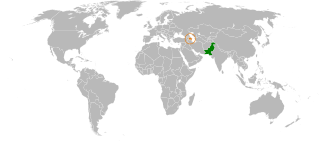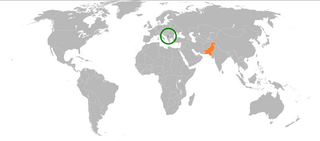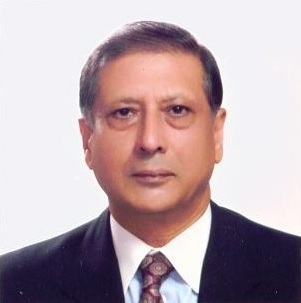
The Islamic Republic of Pakistan maintains a large network of diplomatic relations across the world. Pakistan is the second largest Muslim-majority country in terms of population and is the only Muslim majority nation to have possession of nuclear weapons.

The Shanghai Cooperation Organisation (SCO) is a Eurasian political, economic, International security and defence organization. It is the world's largest regional organization in terms of geographic scope and population, covering approximately 60% of the area of Eurasia, 40% of the world population, and more than 30% of global GDP.

The South Asian Association for Regional Cooperation (SAARC) is the regional intergovernmental organization and geopolitical union of states in South Asia. Its member states are Afghanistan, Bangladesh, Bhutan, India, Maldives, Nepal, Pakistan, and Sri Lanka. SAARC comprises 3% of the world's land area, 21% of the world's population and 5.21% of the global economy, as of 2021.

The Economic Cooperation Organization or ECO is an Asian political and economic intergovernmental organization that was founded in 1985 in Tehran by the leaders of Iran, Pakistan, and Turkey. It provides a platform to discuss ways to improve development and promote trade and investment opportunities. The ECO is an ad hoc organisation under the United Nations Charter. The objective is to establish a single market for goods and services, much like the European Union. After the dissolution of the Soviet Union, the ECO expanded to include Afghanistan, Azerbaijan, Kazakhstan, Kyrgyzstan, Tajikistan, Turkmenistan, and Uzbekistan in 1992.

Northern Cyprus is recognised only by Turkey, a country which facilitates many of its contacts with the international community. After it was occupied by Turkey, Northern Cyprus' relations with the rest of the world were further complicated by a series of United Nations resolutions which declared its independence legally invalid. A 2004 UN Referendum on settling the Cyprus dispute was accepted by the Turkish Cypriots but rejected by the Greek Cypriots. After that, the European Union declared its intentions to assist in reducing the economic isolation of Northern Cyprus and began giving aid to the territory. However, due to pressure from Greece and the Republic of Cyprus, this aid coming from EU funds cannot be used on Greek Cypriot land and property nor on public bodies. As a result, these funds can be used only on 29 percent of people on the island of Cyprus.

Pakistan–Turkey relations are the bilateral relations between Pakistan and Turkey. Pakistan has an embassy in Ankara, a Consulate-General in Istanbul and an honorary consulate in İzmir whereas, Turkey has an embassy in Islamabad, a Consulate-General in Karachi and honorary consulates in Lahore, Peshawar, Sialkot and Faisalabad. As of 2016, in a joint communique, Pakistan and Turkey plan to strengthen their close ties into a strategic partnership.

Pakistan–Tajikistan relations are the foreign relations between Pakistan and Tajikistan.

Pakistan formally consummated diplomatic ties with Kyrgyzstan on May 10, 1992, although relations were initially founded on December 20, 1991, shortly after Kyrgyzstan became independent of the Soviet Union. Consequently, Pakistan opened its diplomatic outpost in Bishkek in 1995.

Relations between Algeria and Pakistan are excellent. Pakistan was one of the first countries to recognize the Provisional Government of Algerian Republic and its mission was opened in Karachi, the then capital of Pakistan in 1958. Both sides have convergence of views on issues of international importance. Both countries have also been supporting each other in various multilateral forums including UN, OIC and NAM. Algeria has an embassy in Islamabad and Pakistan has an embassy in Algiers.

Pakistan–Sri Lanka relations refer to bilateral relations between Pakistan and Sri Lanka. Both countries are located in South Asia. The earliest proper diplomatic and trade contacts between Pakistan and Sri Lanka date back as early as 1948. In 2013, the then prime minister Nawaz Sharif said that there were strong bonds of friendship between the two countries.

Azerbaijan–Pakistan relations refer to bilaterial relations between the Republic of Azerbaijan and the Islamic Republic of Pakistan. Pakistan has an embassy in Baku and Azerbaijan has an embassy in Islamabad. Both countries are enhancing contact between their respective capitals. The two nations are considered "strategic partners".

Maldives–Pakistan relations are the foreign relations between Pakistan and the Maldives.

Sartaj Aziz is a Pakistani economist and a strategist, having previously served as the deputy chairman of the Planning Commission of Pakistan, member of the federal cabinet as the de facto Minister for Foreign Affairs, a Federal Senator as well as the National Security Advisor.

Kosovo–Pakistan relations refer to the bilateral ties between the Republic of Kosovo and the Islamic Republic of Pakistan. Kosovo is a partially recognized state that is claimed by Serbia in its entirety as the Serbian province of Kosovo and Metohija. On 24 December 2012, Pakistan recognized Kosovo as an independent state, becoming the 98th state to do so. Simultaneously, Pakistan's ambassador to Turkey in Ankara was accredited to Kosovo.

Bhutan–Pakistan relations refer to foreign relations between Bhutan and Pakistan. Relations have been active at least since 2004. Both nations are members of the South Asian Association for Regional Cooperation (SAARC) and the United Nations. Neither country has a resident ambassador.

Javid Husain, is a Diplomat, from the Foreign Service of Pakistan, who has had a distinguished career during which he served as the Ambassador of Pakistan to the Netherlands (1992–1995), the Republic of Korea (1995–1997) and Iran (1997–2003). During his tenure at Tehran, he was also the Pakistan Permanent Representative to the Economic Cooperation Organization (ECO).
The 1995 ECO summit was the third Economic Cooperation Organization summit, held 14–15 May 1995 in Islamabad, Pakistan.
The 2012 ECO summit was the twelfth Economic Cooperation Organization summit, held on 16 October 2012 in Baku, Azerbaijan.
The Organization for Economic Co-operation is an intergovernmental organization established in 1985 with cooperation of Turkey, Iran and Pakistan. The crucial goal of this organization is to achieve sustainable economic development, promote trade, integrate to the world economy and develop efficient transport system. Azerbaijan joined the organization in 1992. From August 2012 till 2016, the Secretary General of ECO is a representative from Azerbaijan.
















